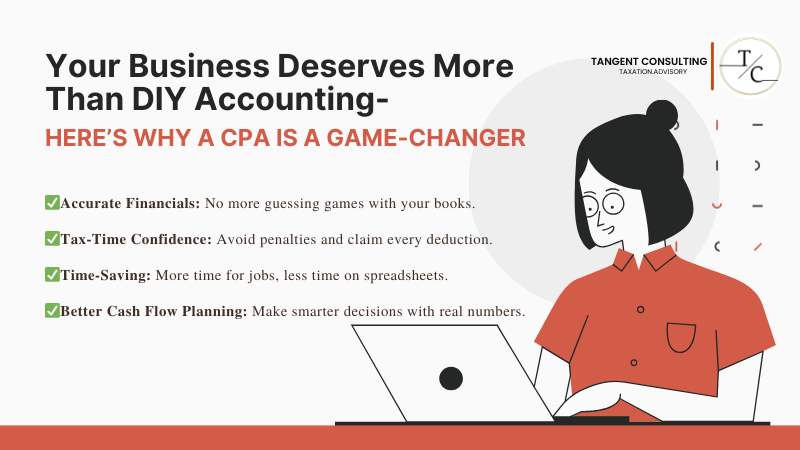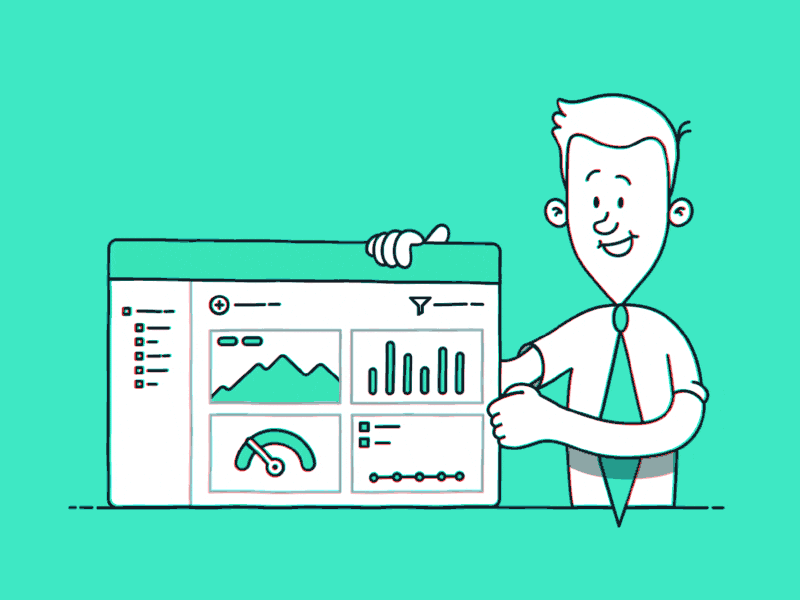The 5 Best Things About Hiring A CPA for Your Small Business
The 5 Best Things About Hiring A CPA for Your Small Business

We once spent three hours trying to smoke a brisket without a thermometer or timer and had no clue what we were doing. It was a disaster, and we ended up ordering pizza.
Now, what does a ruined brisket have to do with your small business? A lot.
Just like cooking requires the right tools and know-how, running a business takes more than just good intentions, especially when it comes to your finances. That’s where hiring a CPA can save you from getting burned.
Let’s break down the five best things about bringing a CPA into your corner and why it’s a better approach for your business.

When’s the Right Time to Hire a CPA?
60% of small business owners feel they aren’t knowledgeable about accounting and finance. Not knowing accounting is just one aspect of hiring a CPA. There are a lot of factors that tell you when the time is right to hire a CPA.
So, here are a few signs:
You’re Running Out of Time
If bookkeeping is eating up your evenings or weekends, it might be time to get help. When you’re spending more hours on spreadsheets than on growing your business, that’s a red flag.
You’re Spotting Mistakes
We’ve all been there—missed deadlines, late tax filings, or numbers that don’t add up. It happens. But when financial errors start to creep in, it’s a sign that things are slipping through the cracks. A CPA can help clean that up.
Your Business is Growing Fast
More money coming in? Awesome. But with growth comes complexity, multiple revenue streams, more expenses, and trickier reporting. If things are starting to feel overwhelming, a CPA can help you stay on top of it all.
Taxes are a Headache
If the word taxes makes you break into a cold sweat, you’re not alone. Maybe you’re unsure about deductions, credits, or how to handle sales across state lines. A CPA can make sure you stay compliant and avoid surprises.

You Want to Get Back to Doing What You Love
You started your business because you’re good at what you do, not because you wanted to become a part-time accountant. If finances are pulling your focus away from your work, a CPA can take that off your plate so you can get back to building and growing.
In short, if managing your books is taking up too much of your time, causing stress, or slowing down your growth, it might be time to hire a pro.
Fun Fact: CPA has been around since 1896 and is older than sliced bread. (Pre-sliced bread came in 1928.)
How to Pick a CPA?
Sure, a CPA can be a game-changer during tax season, but their value goes way beyond that. A pro-CPA can support you through every stage of your business. So, if you’re on the hunt for the right fit, here are a few tips to help you find them:
1. Find Someone Who Knows Your Industry
Every business has quirks; you’ll want a CPA who gets yours. If you run an e-commerce store, for example, your CPA should have experience working with online businesses. The more they understand your world, the better advice they’ll give.
2. Ask Around
One of the best ways to find a trusted CPA is through other business owners. Tap into your network, whether it’s local entrepreneurs, a business group, or even a Facebook community.
3. Do a Quick Reputation Check
Before committing, check out online reviews to see their reputation. A quick background check can help you feel more confident in your choice and spot any red flags.
Pro Tip: Look for CPAs who understand your state’s tax laws. Local knowledge can save you thousands.

5 Best Things About Hiring a CPA
Small businesses that use accountants are likely to survive their initial years. This is just one statistic of why hiring a CPA can benefit your small business. Here are some more benefits:
1. Cut Your Tax Bill and Stay Out of Trouble
A good CPA doesn’t just help you file taxes; they help you save on them. They know all the ins and outs of federal and local tax rules, and they’re great at spotting deductions and credits that can lower what you owe.
More importantly, they help you stay compliant. That means fewer headaches, no nasty surprises from the IRS or CRA, and peace of mind.
2. Get Your Time Back and Focus on Growth
Let’s face it—bookkeeping, payroll, and taxes can be time-consuming. If you’re spending more time on accounting than building your business, something’s gotta give.
That’s where a CPA comes in. They take over the nitty-gritty so you can get back to doing what you do best: growing your business.

3. Get Advice That Fits Your Business
One of the biggest perks of working with a CPA is that they understand the industry. They understand your market, your challenges, and what works within your niche.
A CPA gives you advice that makes sense for your business. They guide you on managing cash flow, investing wisely, or if you are planning to scale your business.
4. Avoid Costly Mistakes
No one wants to deal with an audit or find out there’s a major issue in their books. A CPA helps you avoid that. They dig deep into your numbers, spot any weak points, and help you fix them before they become problems.
They also help with compliance issues, improving internal controls, or double-checking your accounting. They protect you from financial slip-ups that could damage your reputation or bottom line.

5. Set Your Business Up for Long-Term Success
Your business needs more than just short-term wins. You need a strong financial foundation that supports steady growth. That’s what a CPA helps you build.
From keeping your records organized to helping you plan for future opportunities, a CPA gives you the clarity you need to make smart business decisions. With solid data and expert advice, you’re better equipped to hit your goals and grow a stable, profitable business.
If you’re doing your books on Saturday night, watching a YouTube tutorial, it might be time to call in a pro.
CPA vs. Bookkeeper: What’s the Difference?
It’s easy to confuse a CPA with a bookkeeper—they deal with your business finances. But their roles are quite different.
A bookkeeper handles the day-to-day stuff. They track income and expenses, log transactions, and keep everything organized so you always know where your money is going.
If you need regular financial reports—like profit and loss statements—or someone to ensure your books are up to date, that’s what bookkeepers do.
A CPA steps in for the bigger, more complex stuff. They handle tax planning, filing, and audits and can help you make smart financial decisions as your business grows. They’re your go-to when things get more technical or you need expert advice.
So, who should you hire?
Go with a bookkeeper if you need help with everyday financial tasks.
- Hire a CPA if you’re considering long-term planning, tax strategy, or financial decisions that seem overwhelming.
- If your business has a lot going on—multiple income streams, lots of write-offs, or a more complex structure—consider both.
Some CPA firms, like Tangent Consulting, offer bookkeeping, too, so you might be able to cover all your bases with one team.
Final Thoughts
So, now you know hiring a CPA isn’t just about getting tax help. It’s about making smart business decisions, avoiding costly mistakes, and having someone in your corner who gets the financial side of running a business.
After reading this guide, if your gut is telling you it might be time to bring in some expert help, it probably is. Luckily, you don’t need to open another tab for this.
Tangent Consulting is your go-to source for outsourcing your accounting department. We can help you fix small business financial issues by understanding your needs. So, you don’t sleep worrying about your business accounting.
P.S. If you are reading this, it means you can have access to our free consultation for your business. Avail this for free today before we change our mind 😉
FAQs
What is the purpose of a CPA in business?
A CPA helps manage your finances, file taxes, and keep your business compliant. They also offer strategic advice to support growth.
Is it important to have a CPA?
Yes, especially if you want to save time, reduce financial mistakes, and make smart business decisions as your business grows.
What is the difference between a CFA and a CPA?
A CPA focuses on accounting, taxes, and audits. A CFA specializes in investments, financial analysis, and portfolio management.
